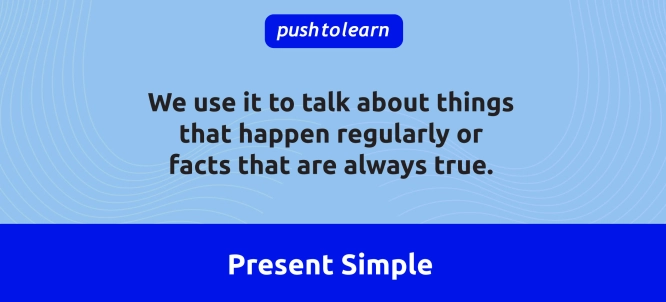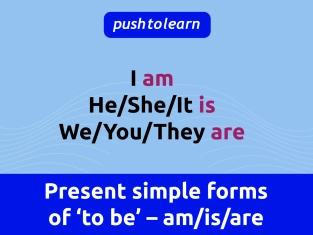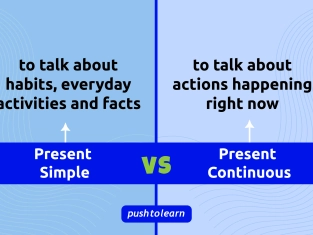by PushtoLearn
Present Simple
Table of Contents
Present Simple Exercises
These exercises focus on Present Simple and how we use it.
Present Simple Tense - table of forms
|
Subject |
Affirmative |
Negative |
Question |
|
I |
I eat breakfast at 7. |
I don’t eat breakfast at 7. |
Do I eat breakfast at 7? |
|
You |
You read a magazine. |
You don’t read a magazine. |
Do you read a magazine? |
|
We |
We walk to school. |
We don’t walk to school. |
Do we walk to school? |
|
They |
They watch films on Fridays. |
They don’t watch films on Fridays. |
Do they watch films on Fridays? |
|
He |
He plays the guitar. |
He doesn’t play the guitar. |
Does he play the guitar? |
|
She |
She drinks tea. |
She doesn’t drink tea. |
Does she drink tea? |
|
It |
It makes a funny sound. |
It doesn’t make a funny sound. |
Does it make a funny sound? |

Affirmative sentences
Form: Subject + verb
Examples:
-
I read books every evening.
-
You travel by bus.
-
We play football after school.
-
They watch TV at night.
For he / she / it, add -s or -es to the verb:
-
She reads books every evening.
-
He watches TV at night.
-
The dog likes meat.
Spelling rules
-
Add -s: work → works, read → reads.
-
Add -es for verbs ending in -o, -ch, -sh, -ss, -x: go → goes, wash → washes.
-
For verbs ending in consonant + y: study → studies, try → tries.
-
Irregular: have → has.
Negative sentences
Form: Subject + do/does not + verb
-
I do not like coffee. → I don’t like coffee.
-
They do not play tennis. → They don’t play tennis.
-
He does not eat fish. → He doesn’t eat fish.
-
She does not work on Sundays. → She doesn’t work on Sundays.
Remember:
-
Use don’t with I, you, we, they.
-
Use doesn’t with he, she, it.
Questions (Yes/No questions)
Form: Do/Does + subject + verb?
Examples:
-
Do you like apples? → Yes, I do. / No, I don’t.
-
Do they live in Paris? → Yes, they do. / No, they don’t.
-
Does he play the piano? → Yes, he does. / No, he doesn’t.
-
Does she read the newspaper? → Yes, she does. / No, she doesn’t.
Wh-Questions
Form: Question word + do/does + subject + verb?
Examples:
-
Where do you live? → I live in London.
-
When do they start school? → They start at 9 o’clock.
-
What does he eat for breakfast? → He eats eggs.
-
Why does she like swimming? → Because it is fun.
The verb to be
The verb to be is special. It does not use do/does in questions and negatives.
Forms: am, is, are
-
I am tired.
-
You are happy.
-
He is tall.
-
We are ready.
-
They are at school.
Negative:
-
I am not tired.
-
She is not here. → She isn’t here.
-
They are not hungry. → They aren’t hungry.
Questions:
-
Am I late?
-
Is he your brother?
-
Are they students?
Have a look at Present Simple Forms of "To Be"
When do we use the Present Simple?
Habits and routines
-
I brush my teeth every morning.
-
She goes jogging on Saturdays.
Facts and truths
-
The sun rises in the east.
-
Water boils at 100°C.
Schedules and timetables
-
The train leaves at 8 o’clock.
-
My lesson starts at 10.
Instructions
-
Open the window.
-
Mix the flour and the sugar.
Stative verbs (verbs that describe states, not actions)
-
I like chocolate.
-
He knows the answer.
-
They need help.
Headlines (in newspapers)
-
Prime Minister meets the French President.
-
City builds a new bridge.
Time expressions with the Present Simple
We often use:
-
always, usually, often, sometimes, never
-
every day / week / year
-
on Mondays / on Sundays
-
at the weekend
-
twice a week, three times a month
Examples:
-
I usually wake up at 7.
-
She never drinks tea.
-
They go shopping every Saturday.
-
The bus leaves at 6 o’clock.

